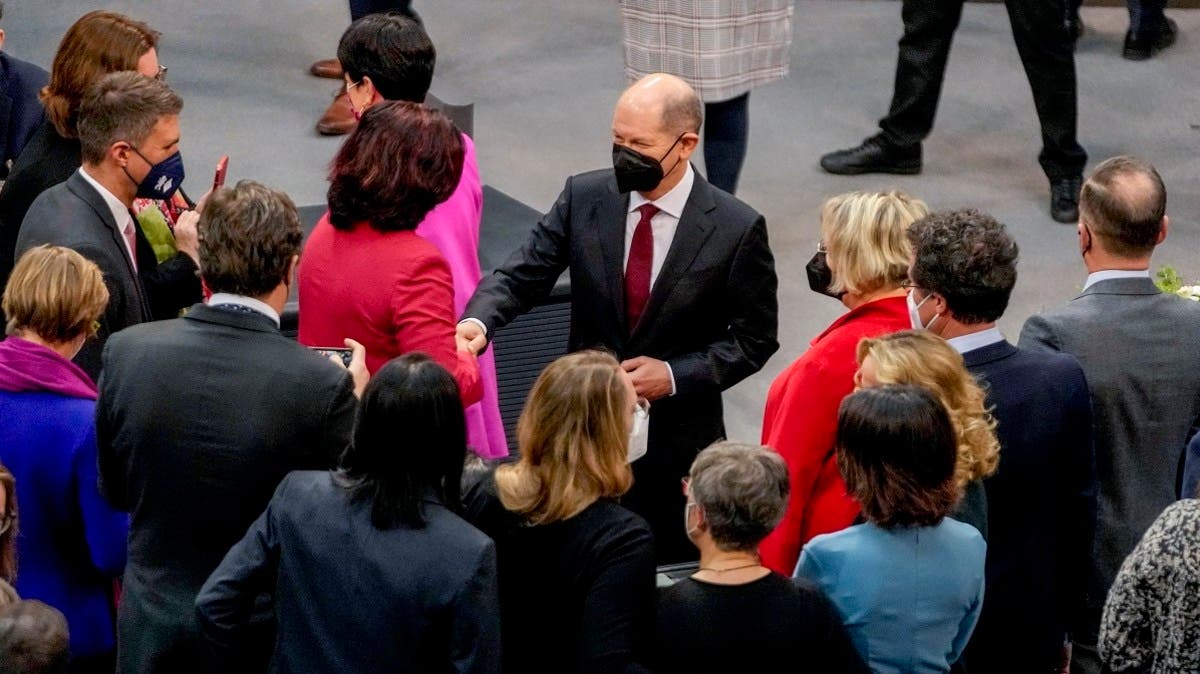Germany’s parliament elected Olaf Scholz as the country’s ninth post-World War II chancellor on Wednesday, opening a new era for the European Union’s most populous nation and largest economy after Angela Merkel’s 16-year tenure.
Scholz’s government takes office with high hopes of modernizing Germany and combating climate change but faces the immediate challenge of handling the country’s toughest phase yet of the coronavirus pandemic.
For the latest headlines, follow our Google News channel online or via the app.
Lawmakers voted by 395-303 to elect Scholz as chancellor, with six abstentions. His three-party coalition holds 416 seats in the 736-seat lower house of parliament.
Scholz exchanged fist bumps with lawmakers from across the political spectrum. He was to be formally named as chancellor by Germany’s president and sworn in by the speaker of parliament later Wednesday.
Merkel, who is no longer a member of parliament, looked on from the spectators’ gallery as parliament voted. Lawmakers gave her a standing ovation as the session started.
Scholz, 63, Germany’s vice chancellor and finance minister since 2018, brings a wealth of experience and discipline to an untried coalition of his center-left Social Democrats, the environmentalist Greens and the pro-business Free Democrats. The three parties are portraying their uniting of former rivals as a progressive alliance that will bring new energy to the country after Merkel’s near-record time in office.
“We are venturing a new departure, one that takes up the major challenges of this decade and well beyond that,” Scholz said Tuesday. If the parties succeed, he added, “that is a mandate to be reelected together at the next election.”
The new government aims to step up efforts against climate change by expanding the use of renewable energy and bringing Germany’s exit from coal-fired power forward from 2038, “ideally” to 2030. It also wants to do more to modernize the country, including improving its notoriously poor cellphone and internet networks.
It also plans more liberal social policies, including legalizing the sale of cannabis for recreational purposes and easing the path to German citizenship while pledging greater efforts to deport immigrants who don’t win asylum. The coalition partners want to lower the voting age in national elections from 18 to 16.
The government also plans to increase Germany’s minimum wage to 12 euros ($13.50) per hour from the current 9.60 euros, which Scholz has said “means a wage increase for 10 million.” And the coalition also pledged to get 400,000 new apartments per year built in an effort to curb rising rental prices.
Scholz has signaled continuity in foreign policy, saying the government would stand up for a strong European Union and nurture the trans-Atlantic alliance.
The three-party alliance brings both opportunities and risks for all the participants, perhaps most of all the Greens. After 16 years in opposition, they will have to prove that they can achieve their overarching aim of cutting greenhouse gas emissions while working with partners who may have other priorities.
Greens co-leader Robert Habeck will be Scholz’s vice chancellor, heading a revamped economy and climate ministry. The government’s No. 3 official will be Christian Lindner, the finance minister and leader of the Free Democrats, who insisted that the coalition reject tax hikes and looser curbs on running up debt.
The incoming government is portraying itself as a departure in both style and substance from the “grand coalitions” of Germany’s traditional big parties that Merkel led for all but four years of her tenure, with the Social Democrats as junior partners.
In those tense alliances, the partners sometimes seemed preoccupied mostly with blocking each other’s plans. Merkel’s final term saw frequent infighting, some of it within her own center-right Union bloc, until the pandemic hit. She departs with a legacy defined largely by her acclaimed handling of a series of crises, rather than any grand visions for Germany.
Scholz told his party last weekend that “it was difficult” governing with Merkel’s bloc, which his Social Democrats narrowly beat in Germany’s September election. He criticized the Union bloc’s “this-far-and-no-further conservatism.”
The agreement to form a coalition government between three parties that had significant differences before the election was reached relatively quickly and in unexpected harmony.
“If the good cooperation that worked while we were forming the government continues to work, it will be a very, very good time for the tasks that lie ahead of us,” Scholz said. He acknowledged that dealing with the pandemic “will demand all our strength and energy.”
German federal and state leaders last week announced tough new restrictions that largely target unvaccinated people. In a longer-term move, parliament will consider a general vaccine mandate. Germany has seen daily COVID-19 infections rise to record levels this fall, though they may now be stabilizing, and hospitals are feeling the strain. The country has seen over 103,000 COVID-19 deaths in the pandemic so far.
Merkel has said she won’t seek another political role after shepherding Germany through a turbulent era. The 67-year-old hasn’t disclosed any future plans but said earlier this year that she will take time to read and sleep, “and then let’s see where I show up.”
Read more: Merkel urges Germans to get vaccinated in final podcast

 World3 years ago
World3 years ago
 World3 years ago
World3 years ago
 Business1 year ago
Business1 year ago
 Entertainment8 years ago
Entertainment8 years ago
 World8 years ago
World8 years ago
 Entertainment8 years ago
Entertainment8 years ago






